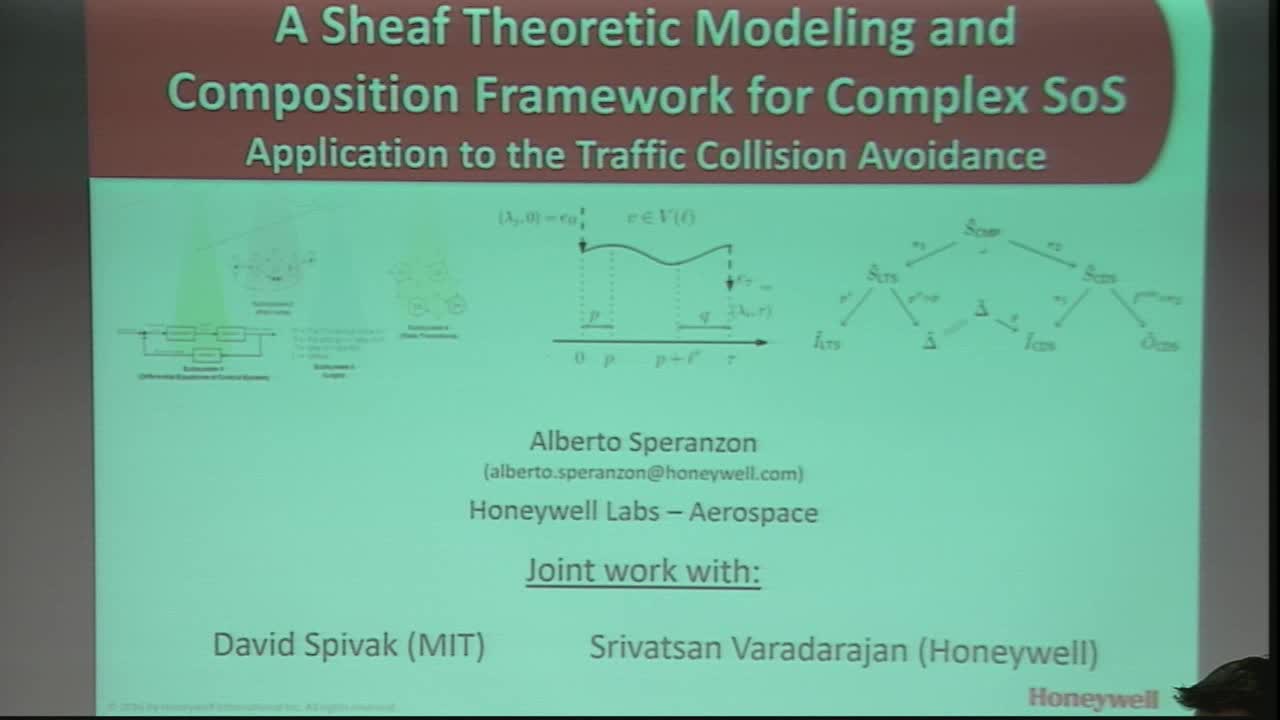A Sheaf Theoretic Modeling and Composition Framework for Complex Systems of Systems: Application to the Traffic Collision Avoidance
Presenter
February 3, 2017
Abstract
The growing need and requirement of today's systems is to provide a multitude of services improving the performance of the processes they monitor and control. To achieve a scalable design paradigm most of these systems are developed by first designing, analyzing and testing subsystems and then by interconnecting them. In order to achieve scalability without completely sacrificing analytical guarantees one needs to mathematically formalize the composition operation. One of the key characteristics such a framework needs to have is the ability to easily compose different models of computation. These are conveniently used to design and analyze each subsystem, but such model may become extremely inconvenient at the time of the composition. This means that the designer needs to first choose a common abstraction model and then translate each submodel in order to compose. Contract-based design methodologies tend to be more flexible in this context, given that no explicit model of each subsystem is required and only certain 'assume-guarantee' contracts are defined. However, again, the mathematical formalization of each subcontract might be easily expressed using different formalisms, making the characterization of the contract of the composition difficult to describe.
In this talk we introduce a new framework for modeling and composing system of systems. The framework enables us to translate various mathematical submodels into a common abstraction based on interval sheaves. Leveraging the compositionality properties of sheaves we are able to define abstract machines that can be composed in an arbitrary way with strong mathematical guarantees. We introduce this framework and then show its applicability to an aerospace scenario. While the example is fairly simple, the purpose is to highlight the capability of the sheaf-based abstraction to enable composition of subsystems that are inherently described by different models of computation.
Joint work with Dr. David Spivak (MIT) and Srivatsan Varadarajan (Honeywell)
Alberto Speranzon received the ‘‘Laurea’’ degree in computer engineering from University of Padova, Italy in 2000, and a Ph.D. in automatic control from the School of Electrical Engineering, Royal Institute of Technology (KTH), Stockholm, Sweden in 2006. In September 2015 he joined Honeywell Labs in Minneapolis, MN, USA where he is a research scientist. At Honeywell, Alberto is working on autonomous systems, leading such research area as program manager and principal investigator, and involved in a NASA sponsored project aimed at developing novel methodologies for systems of systems design and analysis. Before joining Honeywell, he was a research scientist at United Technologies Research Center (UTRC), in East Hartford, CT, USA where, since 2008, he covered various roles of increasing responsibility. At UTRC, Alberto served as project manager and principal investigator of various DARPA sponsored projects on novel methods for navigation in GPS degraded/denied and new mathematics for swarm autonomy where methods cutting across robust adaptive filtering, artificial intelligence, graph theory and algebraic topology were combined. His research interests are mainly in the area of autonomy and cyber–physical systems, and in particular on distributed control, estimation and optimization, planning in complex environments and abstraction methods for swarm intelligence. Alberto received the Outstanding achievement Award in 2009 from United Technologies Research Center, highest award given by UTRC. Before joining UTRC, between October 2006 and September 2008, he was a Marie Curie Research Fellow at Unilever R&D, Port Sunlight, UK, working on biomimetic robotics applications for personal care. During 2006–2008 he was a regular visitor at University of California at Berkeley, USA working on decentralized estimation over sensor networks. He is an associate editor of the IEEE Transactions on Control Systems Technology and part of the Technical Program committee of various conferences in the area of networked control systems, robotics and cyber–physical systems.
